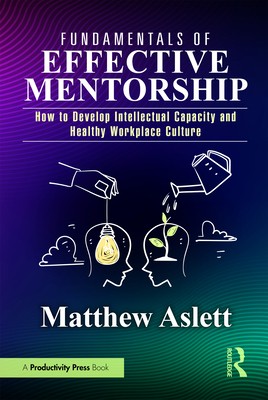
- We will send in 10–14 business days.
- Author: Matthew Aslett
- Publisher: Productivity Press
- ISBN-10: 1032715219
- ISBN-13: 9781032715216
- Format: 17.8 x 25.4 x 1 cm, minkšti viršeliai
- Language: English
- SAVE -10% with code: EXTRA
Reviews
Description
Organizations traditionally focus on product or service specifications, pricing, distribution channels, and marketing in their strategic plans and operational activities. However, organizational leaders must not neglect the importance of an understated element which is human resources. People are integral to the success of any organization as diverse experience, intellectual capacity, and collective culture determine whether an organization's vision can be implemented. As a result, the ability to empower, advise, and teach people can help organizations improve their effectiveness.
The mentorship process is integral for promoting the personal and professional growth of stakeholders within an organization. The implications of effective mentorship can be observed from micro (i.e., individual), meso (i.e., group or organization), and
macro (i.e., broader community) perspectives. Mentorship occurs both formally and informally in most sectors such as education, business, health sciences, law, engineering, arts, and science.
This book communicates critical considerations for the delivery of mentorship programs and the creation of mentorship relationships. Readers are introduced to the mentorship styles and learn about why mentorship must be prioritized in their organizations. The positive and negative effects of mentorship are examined with examples to demonstrate the antecedents. The embedded recommendations are grounded in best practices from the disciplines of organizational behavior, education, and human resources. Mentors will embark on their journey to construct a unique profile that aligns with their values, skills, and objectives through reflective practice. Approaches that emphasize equity, diversity, and inclusivity are presented for
organizational leaders to maximize accessibility and long-term sustainability of mentorship initiatives.
EXTRA 10 % discount with code: EXTRA
The promotion ends in 22d.22:03:33
The discount code is valid when purchasing from 10 €. Discounts do not stack.
- Author: Matthew Aslett
- Publisher: Productivity Press
- ISBN-10: 1032715219
- ISBN-13: 9781032715216
- Format: 17.8 x 25.4 x 1 cm, minkšti viršeliai
- Language: English English
Organizations traditionally focus on product or service specifications, pricing, distribution channels, and marketing in their strategic plans and operational activities. However, organizational leaders must not neglect the importance of an understated element which is human resources. People are integral to the success of any organization as diverse experience, intellectual capacity, and collective culture determine whether an organization's vision can be implemented. As a result, the ability to empower, advise, and teach people can help organizations improve their effectiveness.
The mentorship process is integral for promoting the personal and professional growth of stakeholders within an organization. The implications of effective mentorship can be observed from micro (i.e., individual), meso (i.e., group or organization), and
macro (i.e., broader community) perspectives. Mentorship occurs both formally and informally in most sectors such as education, business, health sciences, law, engineering, arts, and science.
This book communicates critical considerations for the delivery of mentorship programs and the creation of mentorship relationships. Readers are introduced to the mentorship styles and learn about why mentorship must be prioritized in their organizations. The positive and negative effects of mentorship are examined with examples to demonstrate the antecedents. The embedded recommendations are grounded in best practices from the disciplines of organizational behavior, education, and human resources. Mentors will embark on their journey to construct a unique profile that aligns with their values, skills, and objectives through reflective practice. Approaches that emphasize equity, diversity, and inclusivity are presented for
organizational leaders to maximize accessibility and long-term sustainability of mentorship initiatives.


Reviews